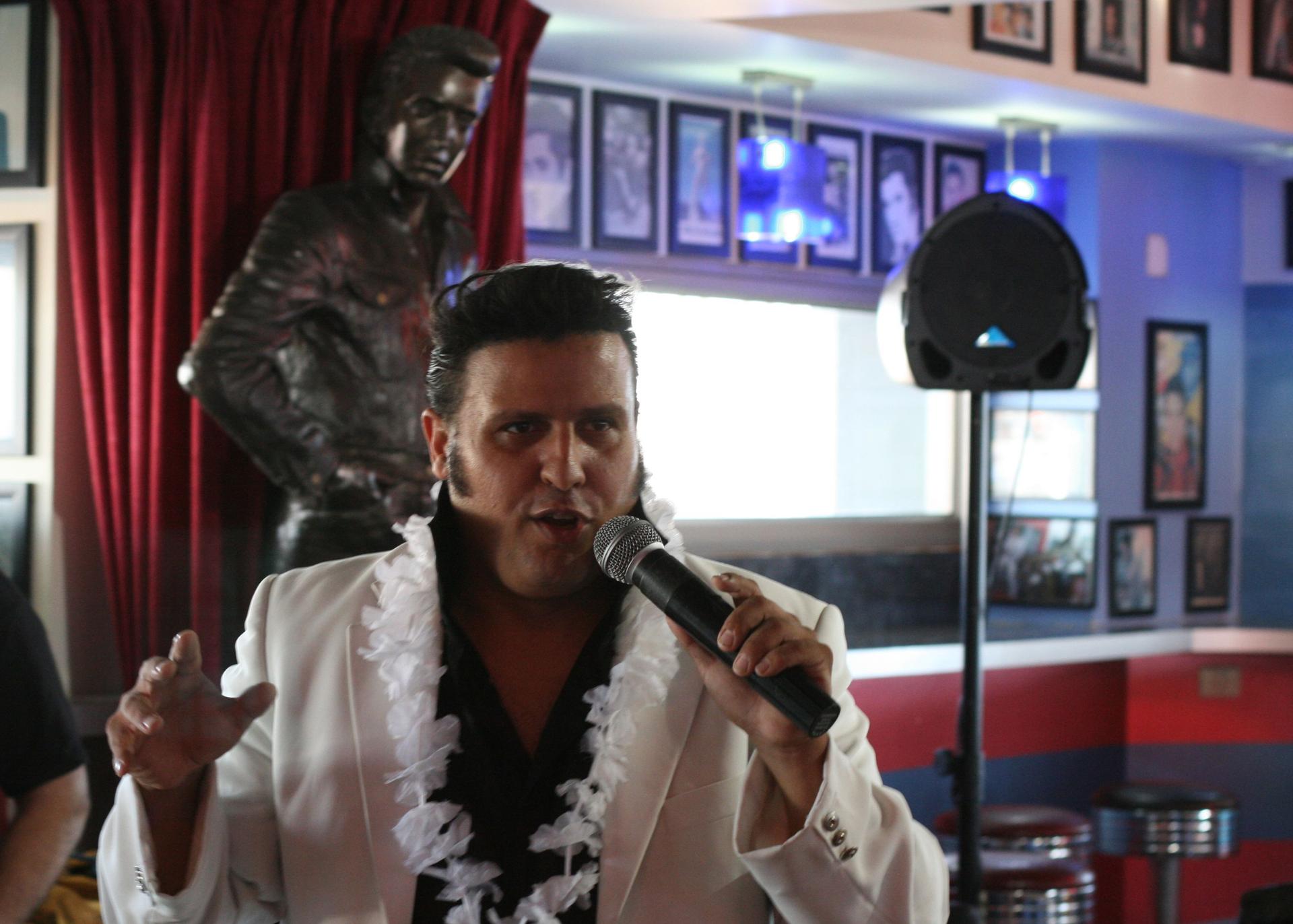“House Elvis,” Eran Levron, performs at The Elvis Inn in Neve Illan, Israel.
Yossi Rozen drove an hour and a half from his home to Neve Ilan, a town just outside Jerusalem, for the chance to grab a microphone and belt out “Blue Suede Shoes.”
At 70 years old, Rozen was one of a half-dozen men crooning to customers seated at circular tables on a recent Saturday. They gathered at The Elvis Inn, a classic American diner in Israel, where patrons ate burgers and fries alongside platters of hummus and finely chopped salads of tomatoes and cucumbers.
Around them, every wall was covered in Elvis photos, concert posters and album covers. There were Elvis statues in the windows and perched on some of the tables. Owner Uri Yoeli has amassed this collection over his four decades in business.
August 16 was the 37th anniversary of Elvis' death. Every year his fans flock to the Elvis Inn to honor him, but this year the event was overshadowed by the war in Gaza. The usually busy roadside eatery, right by a gas station, was empty for weeks.
“There were no people, no tourists at all, and we sit here and we listen to Elvis alone without people,” Yoeli said.
The Israeli Finance Ministry estimates the short conflict in Gaza reduced the national economy by 0.5 percent, with restaurants and hotels taking the hardest hit. Israeli eateries lost at least $100 million this summer. Yoeli said he is only now starting to recover from a month-long slowdown, and the Elvis anniversary day was a welcome break from the summer doom and gloom.
By the time Elvis died in 1977, Yoeli was already running the Elvis Inn. A few years later, he invited Elvis impersonators to mark The King’s birthday — January 8 — as well as the day of his death, with karaoke and a costume party.
Eran Levron, also known as "House Elvis," wore a black shirt, a white jacket studded with rhinestones in the shape of an eagle and his black hair slicked back in a pompadour.“I think the spirit of Elvis is inside of me when I sing,” Levron said while standing underneath an Elvis statue that towers over the restaurant's door. He spoke in a southern American twang mixed with an Israeli accent.
Motti Regev, a sociologist and music expert at the Open University of Israel in Ra'anana, said it’s not that peculiar to see this kind of kitsch in Israel. Elvis shook up the same feelings in Israelis as he did around the world: A youth rebellion.
“There were hardly any electric guitars in the 50s and 60s, you never heard them,” Regev said. “The major thing during that period was the army ensembles that combined folklore, sort of pastoral Israeli music, and mostly French chanson. And in this regard, following Elvis as a musician inspired by rock 'n' roll, or if you’re a fan listening to his records, had an ideological meaning of performing a rebellion.”
Elvis inspired the same long sideburns and flared pants in Israel as he did in the US, and maybe even a little more swiveling of the hips. But today, Regev said, Elvis is wearing off in Israel as an enduring symbol.
Most of the singers at the anniversary event were over the age of 60. When they’re gone, that may be the end of tributes and impersonations. But singing the songs of their teen idol was a way for these Israeli fans to feel that Elvis is still here — and to escape the harsher realities of life in the Middle East.
We want to hear your feedback so we can keep improving our website, theworld.org. Please fill out this quick survey and let us know your thoughts (your answers will be anonymous). Thanks for your time!
